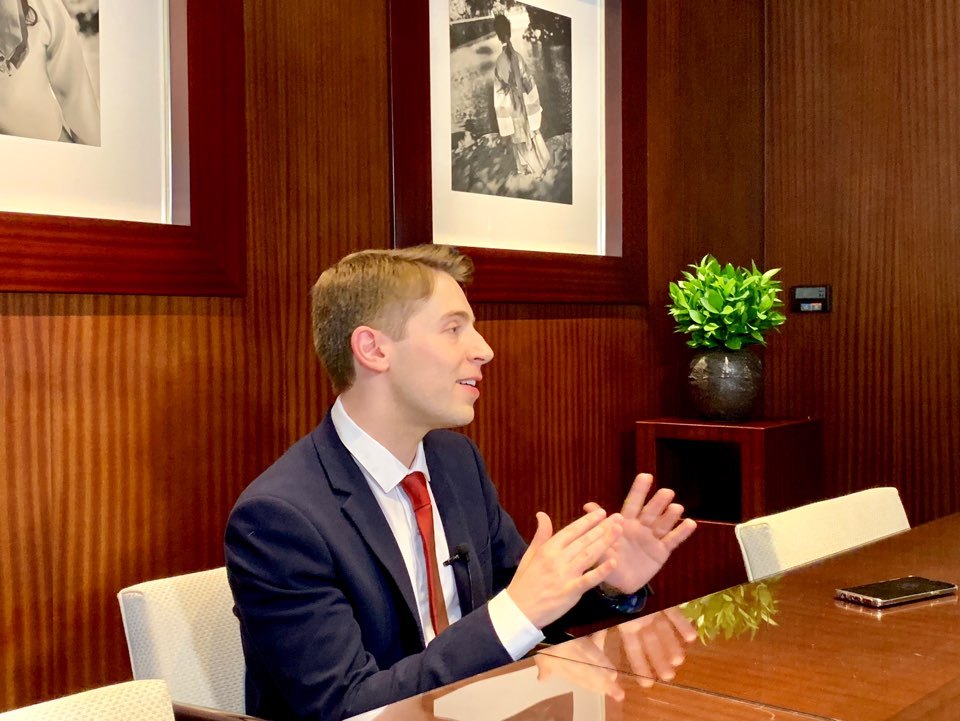[Herald Interview] Observing K-pop crossover from other side
By Im Eun-byelPublished : July 2, 2019 - 16:43
While K-pop crossovers have been enjoying momentum, a columnist shared his opinion on the global phenomenon and its development from the perspective of an outsider looking in.
Jeff Benjamin is a freelance columnist based in the US who writes about K-pop and other genres of music. He is passionately appreciated by “Army,” referring to the BTS fandom, for actively introducing the K-pop band to the larger Western public.
Jeff Benjamin is a freelance columnist based in the US who writes about K-pop and other genres of music. He is passionately appreciated by “Army,” referring to the BTS fandom, for actively introducing the K-pop band to the larger Western public.

“I always grew up with this idea that music could be great no matter what language it was from where it came from,” Benjamin said in an interview held Sunday before the 2019 Culture Communication Forum at Grand Hyatt Seoul. He added that limited knowledge of the Korean language for him or any other person does not present a barrier when it comes to enjoying the K-pop trend.
“There are so many additional contents, elements to get people excited about the music so that they overcome the language barrier,” he said.
“I think what I loved about K-pop is that it thought about the whole picture. It was not just about the music,” the columnist said. “It was about the music videos, the performances, the music programs, the members, how the groups were constructed, their concept and the colors. All these things were so well thought out. It was like pop music brought to a new level.”
Benjamin commented that K-pop focuses heavily on fan participation. He said that K-pop is a lot about making the whole “following my band” experience more engaging.
“To me the most amazing part is that there are so many things very specific to K-pop scene, voting on music programs or staying up to watch V Live or whatever it might be, there are so many things that are very -- for a lack of better term –’Korean’ for that music scene,” he said.
Concerning a recent series of sex and drug scandals within the K-pop industry, Benjamin was skeptical of some perspectives labeling the events to be part of a “K-pop controversy.”
“It is sort of getting grouped as this big K-pop controversy. Everyone thinks it’s this one company that represents everyone. It helped me understand there are still a lot of change, growth and work that needs to be done,” he said.
Despite the recent strides K-pop has made across the world, Benjamin stressed that much more representation of the Asian market needs to happen from within itself, showing that a certain shady aspect of the market does not represent the whole.
“We need to know that the scandal of an artist does not represent the whole country or the industry,” he said.
Though the events have affected the overall image of K-pop, Benjamin thinks the industry will get back on track soon through nothing else but music.
“What will happen is that people go back to the music,” he said. “If we get back to the music and music becomes the focus again, I think the scandals will become less important.”
Meanwhile, the columnist hopes that more K-pop groups will be allowed to break free from rules and express themselves more.
“Artists should feel more comfortable, more natural and more open to be able to just speak about themselves as artists. I think lots of time K-pop has this image that is very formal. But I don’t think fans really appreciate that,” he said.
“We become fans of artists not only for their music but for their personality, too. Artists like BTS have always had great interviews because they’ve always had ability to be looser and be able to speaker about themselves as artists.”
Benjamin added, “Let the artists be artists, let them be human.”
By Im Eun-byel (silverstar@heraldcorp.com)


















![[KH Explains] Hyundai's full hybrid edge to pay off amid slow transition to pure EVs](http://res.heraldm.com/phpwas/restmb_idxmake.php?idx=652&simg=/content/image/2024/04/18/20240418050645_0.jpg&u=20240418181020)

![[Today’s K-pop] Zico drops snippet of collaboration with Jennie](http://res.heraldm.com/phpwas/restmb_idxmake.php?idx=642&simg=/content/image/2024/04/18/20240418050702_0.jpg&u=)